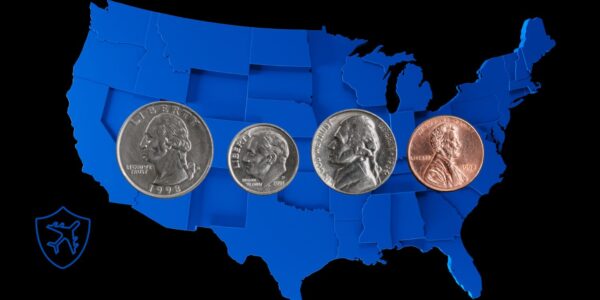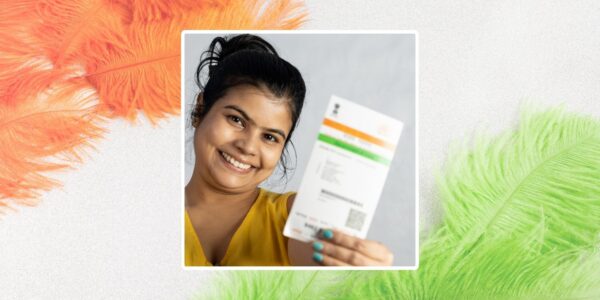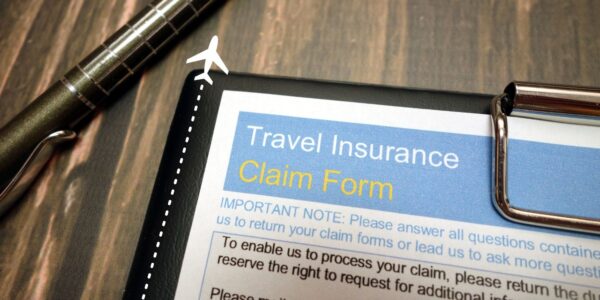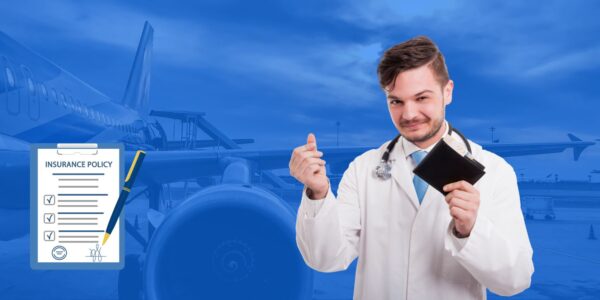Travelers Guide To Taking Prescription Medicine Into The US
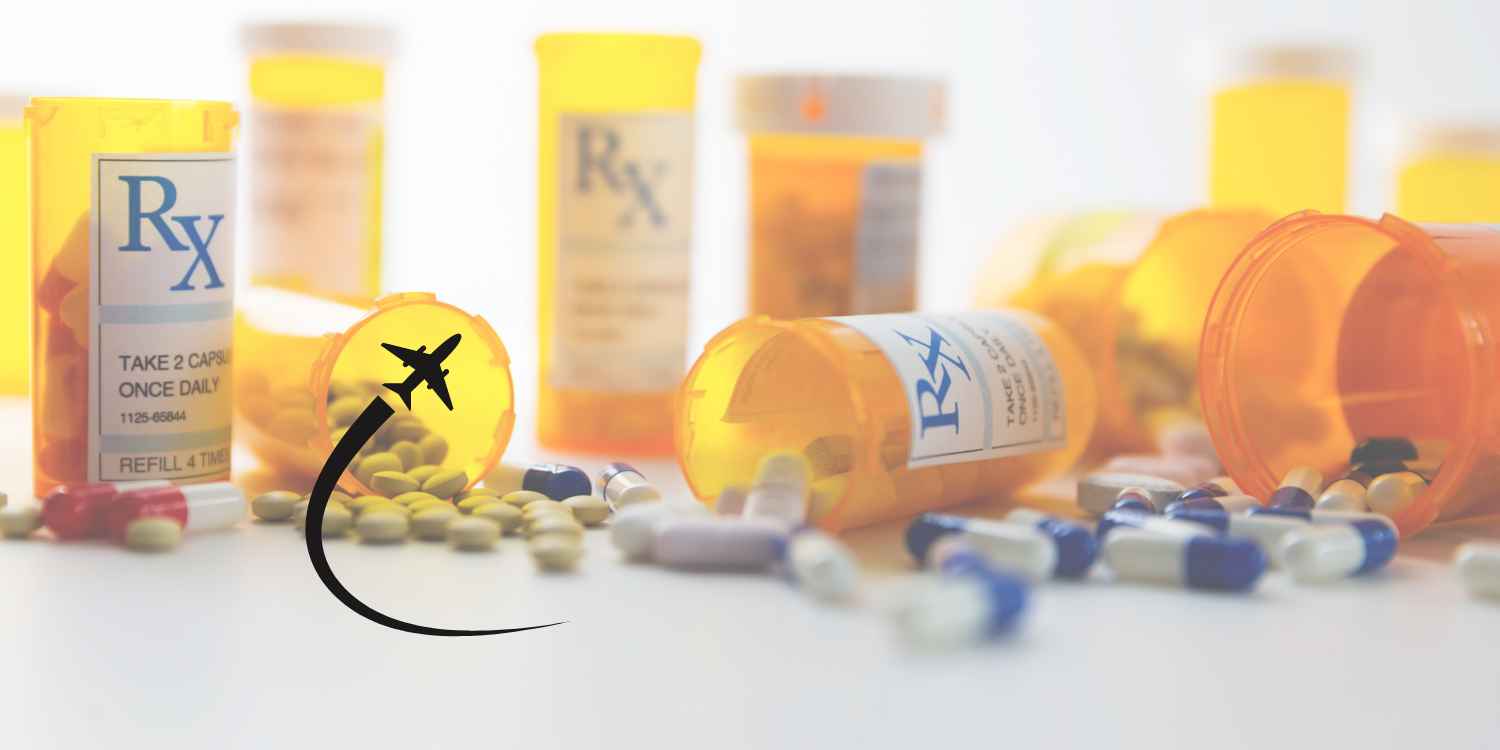
This travelers guide to taking prescription medicine into the US can be helpful for those who are traveling and need to carry their medicines with them.
It is common to take over-the-counter medications (or non-prescription medicines) with us whenever we go on a trip, whether domestically or internationally, just in case we might need them.
But can you travel with your prescription medicine to the United States? The short answer is yes. US airport security is fairly lenient with carrying prescription medicine, yet there are certain rules you need to comply with.
This article will detail the guidelines for traveling with medication into the U.S.
When you come to the U.S. with your prescription medications, there are three authorities that you’ll have to go through before you can enter the country.
- The U.S. Food & Drug Administration (FDA) determines the admissibility of the drugs. In most cases, it is illegal to import drugs not approved by the FDA into the US since the FDA can’t ensure their safety or effectiveness. If you need to ask any specific questions to ask if a drug can be imported, you can visit the FDA website, or call them.
- The U.S. Customs and Border Protection (CBP). You may need to declare all drugs and medicines to the appropriate CBP officer.
- The Transportation Security Administration (TSA). If you have any questions about the airport checkpoint screening process of any medicines and other special circumstances, you can call the transportation security administration.
The rules and regulations will be different with different agencies and may have other requirements or jurisdiction over a product. So it is better to check with each agency before you travel with medicines into the country.
Senior travelers consider travel insurance for the USA.
Guidelines For Carrying Medicine Into The US
- A valid prescription or doctor’s note is required on all medication entering the U.S.
- Prescription medications should be in their original labeled containers with the doctor’s prescription printed on the container.
- If your medications or devices are not in their original containers, you must have a copy of your prescription with you or a letter from your doctor.
- You can only carry no more than 90 days’ supply of medicines.
- If you are staying in the US for more than 90 days, you can get them by mail or courier like FedEx, UPS, etc.
- If you plan to ship your medicines, you’ll need to provide documentation to prove that the medication is being sent for your personal use while you are in the U.S. This may include a copy of your visa or passport, the letter from your doctor, copy of the prescription (in English).
- If you are carrying any specialized medical devices that have sharp objects like needles and oxygen tanks, contact TSA regarding their requirements.
- Check out the CBP Prohibited and Restricted items web page under Medication for details.
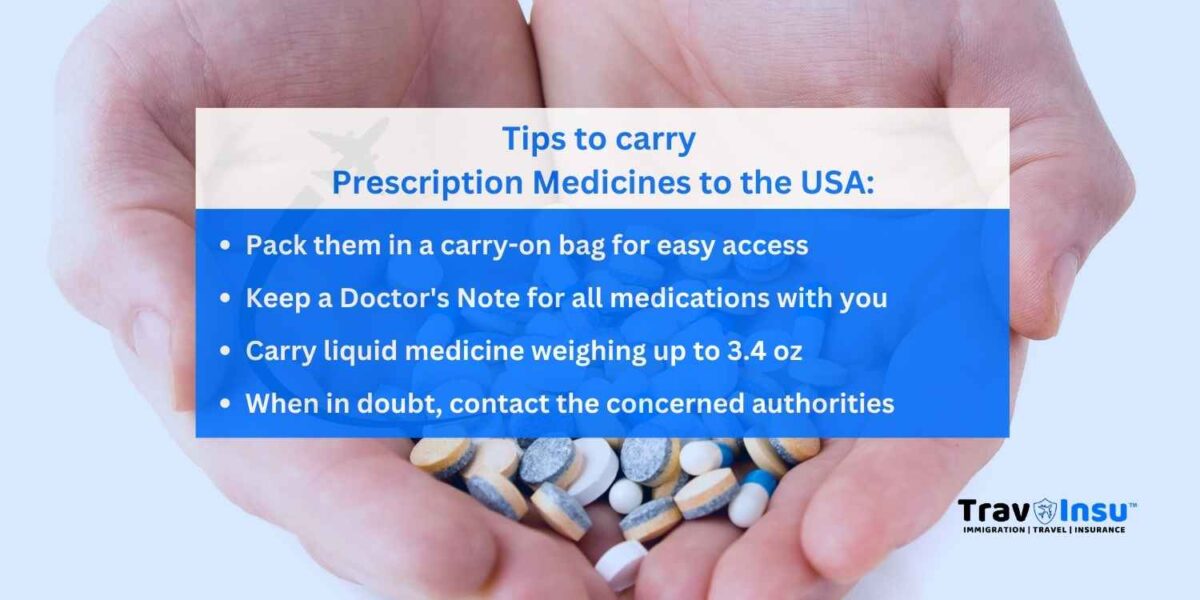
When Can You Import Medicines For Personal Use?
A word of caution: The FDA prohibits personal importation, by mail or in person, of fraudulent prescription and nonprescription drugs and medical devices. It is illegal to import drugs used in other countries if they haven’t been approved by the FDA for use or sale in the U.S.
However, there are situations in which the FDA will allow the importation of medicines:
- The drug is used to treat a serious illness and there is no appropriate treatment available in the US;
- It is not advertised or sold to citizens of the US;
- It does not pose a serious health risk;
- It is necessary to confirm in writing that the medications are for personal use, and to either provide the contact information of the physician who prescribed them or to show that the drugs are for the continuation of treatment that was started in a foreign country;
- Typically, only three months’ worth of drugs should be imported.
Shipping Of Prescription Medications
If you are a foreign national (either a non-US citizen or a permanent resident of the U.S.) who is in the US temporarily and needs to have your prescription medication sent to you by mail or courier, you have to provide documents:
- A copy of the visa/passport
- Copy of Prescription (in English)
- A letter from your doctor explaining that you are under their care, and the medication is for you.
- Your doctor should explain the situation behind shipping the medication, including mentioning your country of citizenship, your temporary visit to the US, and that you need it because either you have run out of your medications or lost them, etc.
- The letter should be sent along with the package and be addressed to Customs and Border Protection (CBP) or a broker.
Traveling to the USA? Consider the benefits of travel insurance.
Importing Of Controlled Substances
Controlled substances are drugs or products that are tightly controlled by the government because they can be abused or cause addiction. The control of the drugs applies to the way they are made, used, handled, stored, and distributed. This can include opioids, stimulants, depressants, hallucinogens, and anabolic steroids.
There are severe penalties for importing such substances into the US. So it’s best to take precautions to avoid the consequences.
For importing such substances for personal use, the Drug Enforcement Agency (DEA) makes the final decision. Some cough medicines, tranquilizers, sleeping pills, antidepressants, or stimulants can contain potentially addictive drugs or narcotics.
You can take the following steps in such a situation:
- Declare all the medicines that you have to the appropriate CBP official;
- Carry the medicines in their original containers;
- Carry only reasonable quantities of the drug for the medical condition
- Carry a written note from your doctor stating that the substance is being used under his/her supervision and they are responsible for your well-being while traveling.
For additional information, visit the DEA website.
Note: There are additional requirements for U.S. residents carrying legally acquired controlled substances (other than illegal drugs like marijuana, cocaine, heroin, or LSD) into the US from other countries.
If you don’t have a prescription for the substance from a US-licensed medical practitioner (registered with, and authorized by the DEA), you cannot import more than 50 dosage units of the substance into the U.S. But if you do have a prescription from an authorized person, you can import more than 50 dosages, if all other legal requirements are fulfilled.
TSA Travel Tips For Carrying Medicines To The US
- Unless your prescription is in liquid medications, it is not necessary to notify the TSA agent about any medication you are traveling with.
- Liquid medicine in a carry-on bag weighing up to 3.4 ounces is acceptable.
- It is not necessary to place medically required liquids in a zip-top bag. However, you must inform the officer that you have medically necessary liquids at the start of the screening checkpoint process.
- Medication in pill or solid form in unlimited amounts is permitted as long as it is screened.
- Medicines can be transported in both carry-on bags or checked baggage. The best way to carry them is in your carry-on luggage in case you need immediate access.
- The TSA does not require passengers to have medications in prescription bottles, but states have individual laws regarding the labeling of the medicines, with which travelers need to comply.
- Medications are usually screened by X-ray, however, if a passenger does not want a medication X-rayed, he or she can request a visual inspection instead. Make this request before sending any objects through the X-ray tunnel.
- There has never been a ban on nitroglycerin tablets or sprays, which are used to treat angina attacks in persons with coronary artery disease.
Frequently Asked Questions
How should I pack my prescription medication?
Travel experts advise taking all doses of the prescription medications and medical supplies you’ll need for your vacation in your carry-on bag, if at all possible, despite the TSA’s suggestion that you only bring the prescription medications and medical liquids you’ll need. You don’t want to be without your pill box if your flight is delayed or you miss your connection.
The chance that crucial prescriptions may get misplaced in transportation is lower if you bring your medications on the flight. Even while delayed luggage is always a hassle, it might become risky if you have a strict medication schedule.
Does TSA check my prescription pills?
A transportation security administration officer may likely question you about the medication, especially if it is a controlled substance since your medications will go through the usual x-ray screening procedure. The best way to show what medications you are carrying is to keep a detailed list of your medicines on your phone or paper.
Do I have to declare medication at customs?
If the medically necessary liquid or gel substances are in bottles or containers greater than 3.4 ounces, you must declare them to a security screening officer when you arrive at the security checkpoint.
You have two options for declaring your prescription medication to the screening officer: verbally or in writing. To speed up the screening process, bring your doctor’s notes, your original prescription bottles or containers, and other supporting documents.
What if a generic version of a medicine is available overseas but not in the US?
Personal importation of unapproved versions of FDA-approved drugs from overseas is not permitted by the FDA. FDA cannot guarantee that foreign-made versions of FDA-approved medications have been correctly manufactured, are safe and effective, or have the same formulation as the FDA-approved versions.
When visiting the US, can a foreign traveler fill a prescription?
You should see a healthcare professional if you need to fill a prescription while traveling to the U.S. It may vary from state to state, but only a few pharmacies are able to fill a foreign prescription.
Conclusion
It is not that difficult to comply with the regulations for importing prescription medications into the US. If you follow the rules, your journey will go without a hitch. For the sake of convenience, be sure to include all required paperwork, including doctor’s notes and written prescriptions for any medications.
One thing about flying internationally is that some destinations have medication restrictions. For instance, certain allergy and sinus medications are not allowed in Japan.
Before flying to any country, check with the foreign embassy of your destination country to ensure that traveling with medication is permitted.
Have a safe trip!
